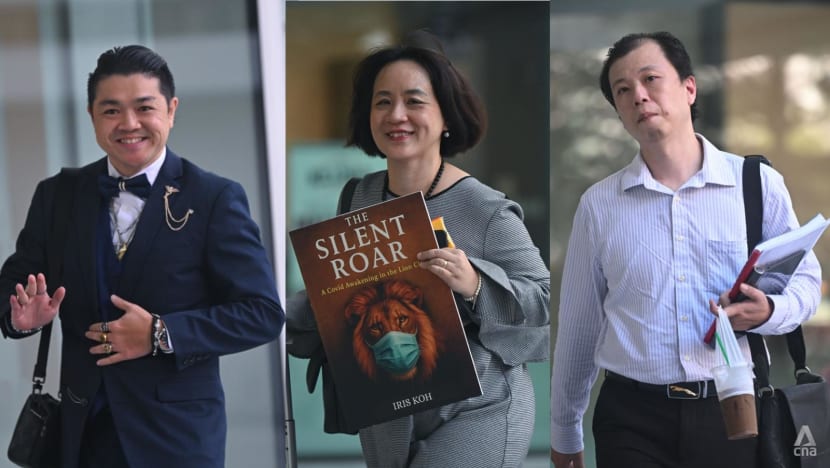 |
| (From left) Dr Jipson Quah, Iris Koh Hsiao Pei and Thomas Chua Cheng Soon at the State Courts on Jul 28, 2025. (Photos: CNA/Syamil Sapari) |
Lydia Lam
28 Jul 2025
SINGAPORE: A court ruled on Monday (Jul 28) that contested police statements by a doctor in a case of fake COVID-19 vaccines are admissible and can be used by the prosecution.
The six statements, made in January 2022 by Dr Jipson Quah, implicate his co-accused Iris Koh Hsiao Pei and identify patients who allegedly used saline instead of COVID-19 vaccines.
Dr Quah, 37, is on trial along with his clinic assistant, Thomas Chua Cheng Soon, 43, and Koh, 49, who founded Healing the Divide, a group that is known to be against COVID-19 vaccination.
Quah is contesting 17 charges of dishonestly making false representations to the Health Promotion Board that his patients had received the COVID-19 vaccines, when they had not.
He is accused of conspiring with his patients, Koh and Chua, in various permutations.
However, soon after the trial began, Dr Quah's lawyer Adrian Wee objected to the six contested police statements being used.
In the six contested statements, Dr Quah identified 15 to 17 patients who had taken saline shots instead of COVID-19 vaccines, in order to be reflected as vaccinated in the National Immunisation Registry.
He also claimed that Koh was the "complete mastermind" and that most of the patients were directed to him by Koh.
Dr Quah alleged that the statements were given under two inducements while he was remanded for investigations.
First, that he could be granted bail if he helped the police identify the names of patients who received fake vaccinations.
Second, that he could be given bail if he helped the police to implicate his co-accused Koh in his statements.
This issue was looked at in an ancillary hearing – a separate hearing to decide on this specific issue – over several days.
On Monday, District Judge Paul Quan agreed with the prosecution that the statements were admissible and that no threat, inducement or promise was made by the police officers to Dr Quah.
Judge Quan said the statements were given voluntarily, and that Dr Quah had continued to implicate Koh even after being bailed out, "indeed doubling down".
The main trial will resume in the afternoon, with one of the investigation officers recalled to the stand.
Dr Quah is represented by Mr Adrian Wee, while Mr Wee Pan Lee defends Koh. Chua is currently unrepresented but said he is in talks to get a lawyer on board.
Source: CNA/ll(mi)
